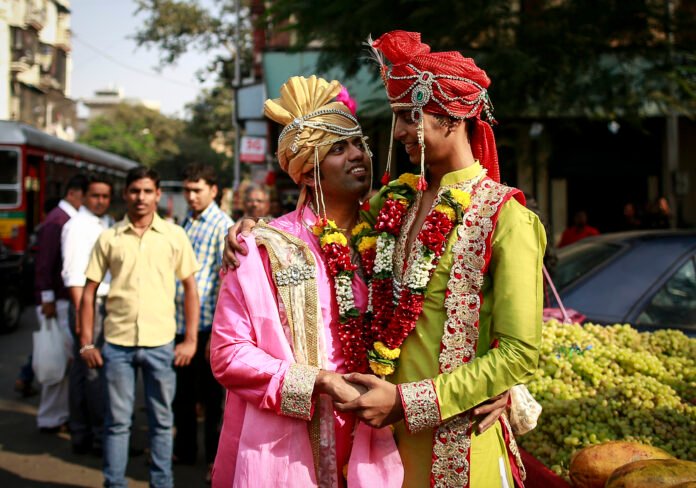
As Pride Month unfolds globally, India celebrates the strides in LGBTQ+ rights and the ongoing fight for equality. This period brings into sharp focus the unique challenges faced by the community, particularly where societal expectations and legal constraints intersect, complicating their lives.
In India, tradition often trumps individual expression. LGBTQ+ individuals continue to navigate a complex social landscape marked by both progress and persistent barriers, one of them being marriage equality. A phenomenon known as “lavender marriages” has emerged as a means for some to navigate these pressures.
Lavender marriages involve LGBTQ+ individuals entering into heterosexual marriages to conform to societal norms, often as a compromise to preserve family honor and avoid the stigma associated with being openly queer. These marriages, while providing a facade of social acceptance, come at a significant personal cost. They compel individuals to suppress their true identities, leading to a life of emotional turmoil and unfulfilled relationships.
Societal expectations in India place immense pressure on individuals to marry and produce offspring, often sidelining personal happiness and authentic self-expression. LGBTQ+ individuals, particularly those from conservative families, find themselves cornered into these marriages of convenience. They compromise their identities to meet familial and societal expectations, resulting in a life of duality and secrecy.
Despite the decriminalization of homosexuality in 2018, marriage equality remains elusive in India. The legal system does not recognize same-sex unions, leaving LGBTQ+ couples without the legal rights and protections afforded to heterosexual couples. This lack of recognition perpetuates the need for lavender marriages, as same-sex couples seek to navigate a society that still largely views heterosexual marriage as the norm.
Activists and advocates continue to fight for true equality, pushing for legal recognition of same-sex marriages and broader acceptance of LGBTQ+ identities. They argue that true equality will only be achieved when individuals can openly express their identities without fear of social ostracism or legal repercussions. The fight for marriage equality is not just about legal rights but about the broader acceptance and validation of LGBTQ+ relationships in society.
As India celebrates Pride Month, the spotlight on lavender marriages underscores the need for continued advocacy and education. It highlights the importance of creating a society where LGBTQ+ individuals can live openly and authentically, free from the pressures to conform to heteronormative standards. The journey towards true equality is ongoing, and every step forward brings hope for a more inclusive and accepting future.
Lavender marriages also raise concerns about the mental health and well-being of those involved. The constant pressure to hide one’s true identity can lead to significant psychological distress, including anxiety, depression, and a sense of isolation. Mental health professionals emphasize the importance of supportive environments where individuals can express their true selves without fear of judgment or reprisal.
In recent years, there have been small but significant cultural shifts in some parts of India. Urban areas, in particular, are seeing a growing acceptance of LGBTQ+ identities. Pride parades, LGBTQ+ support groups, and inclusive policies in workplaces are slowly changing the narrative. However, these changes are often limited to larger cities, and many individuals in rural or conservative areas still face severe challenges.
The media also plays a crucial role in shaping public perception and acceptance of LGBTQ+ individuals. Positive representation in films, television, and social media can help normalize queer relationships and provide much-needed visibility. Stories that highlight the struggles and triumphs of LGBTQ+ individuals can foster empathy and understanding, paving the way for greater societal acceptance.
Educational institutions have the potential to be powerful agents of change. By incorporating LGBTQ+ issues into curricula and promoting inclusive policies, schools and universities can help break down stereotypes and foster a more accepting environment for future generations. Comprehensive sex education that includes discussions on sexual orientation and gender identity is essential for creating an informed and empathetic society.
Legal reforms are also critical in advancing LGBTQ+ rights in India. Activists continue to advocate for the legalization of same-sex marriage, anti-discrimination laws, and protections for LGBTQ+ individuals in the workplace. These legal changes would provide essential rights and protections, ensuring that LGBTQ+ individuals can live freely and openly.
As India celebrates Pride Month, it is a time to reflect on the progress made and the challenges that remain. The stories of those forced into lavender marriages underscore the need for continued efforts to achieve true equality. By fostering a society that embraces diversity and champions the rights of all individuals, India can move closer to a future where everyone can live authentically and without fear.
